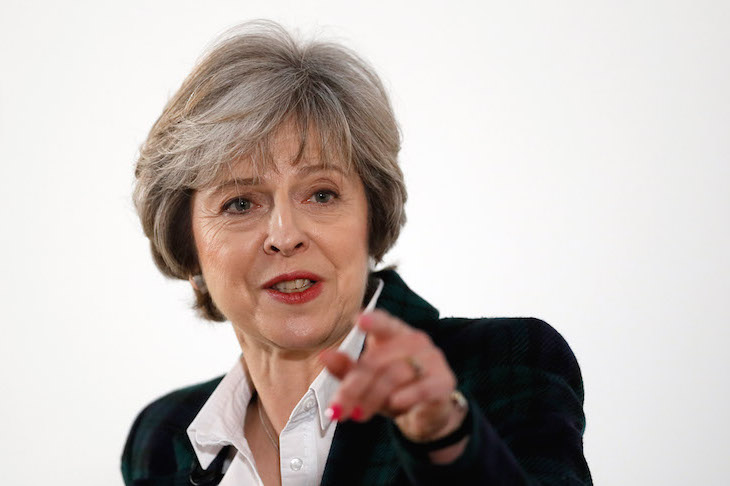From the start of the European Union referendum campaign, competing visions of Brexit have been advocated. To Nigel Farage, the case for leaving the European Union was all about what we did not like (the diktats, the immigration, etc). This played into the caricature cleverly presented by the Remain campaign: the shaking fist of Little England, a country that had had enough of foreigners and the tolerance that the European project represented. Then came the vision put to Britain by the Vote Leave campaign, articulated by Michael Gove and Boris Johnson. It was of a globally minded Britain, fed up with the EU’s parochialism. A country itching to go out and into the world.
Theresa May has now firmly endorsed the Boris Johnson vision. Her speech this week about a ‘global Britain’ taking advantage of Brexit to build — not diminish — trading and other links with the rest of the world places the government where it should have been all along. She has made a clear statement: that Britain is leaving this supranational organisation not because it is too big and too open but because it is too small and too closed. She will not attempt to stitch up some deal whereby Britain remains half in the single market, but will instead seek a free-trade agreement with the EU — exactly as she will do with economies outside the EU.
With the new US President stating his desire for a quick bilateral trade deal with the EU, it is now highly likely that Britain will establish free trade with the world’s largest economy sooner than the EU does — a reversal of how it might have seemed a year ago when Barack Obama told us we would be ‘at the back of the queue’. With South Korea, India, New Zealand and several others making similar offers, it seems that our vision is one shared by like-minded countries the world over.
That said, Theresa May has taken time to find her feet over Brexit. At times it seemed she believed it was about making lists of foreign workers, or destabilising EU migrants by using them as bargaining chips. Her instincts seemed to be protectionist, with talk of an ‘industrial strategy’ and new rules to frustrate foreign takeovers. But one of the Prime Minister’s strengths is that she does not cling on to bad ideas for long. Just as she has gone cool on the idea of compulsory workers on company boards, her approach to Brexit has evolved. Control of migration is no longer her overarching purpose, but one element of a strategy calculated to place Britain where it has been, intermittently, throughout its history — as one of the world’s pre-eminent champions of free trade and open economies.
While adopting Boris Johnson’s upbeat vision of Brexit, Mrs May has added her trademark hint of menace. Declare a trade war, her Chancellor said this week, and the UK always has the option of creating a corporate tax haven, a Singapore West on the EU’s doorstep. He quickly went on to say that this is not what he wants to happen, but the likes of Jean-Claude Juncker should take it as it was intended: a reminder that the EU cannot freeze Britain out of global markets.
The EU has now failed to close free trade deals with the world’s three largest economies — the US, China and Japan. This was due to the ponderous nature of negotiations which have to include 28 nations — and in the case of the collapsed Transatlantic Trade Partnership, to protests at a deal that would have allowed large corporations to challenge the right of governments to run their own public services. In the meantime, Switzerland has concluded deals with both China and Japan.
Donald Trump is widely held up to be an enemy of free trade — understandable given that he spent much of his election campaign promising to rip up such agreements in an attempt to preserve jobs in rustbelt states. Yet over the past few weeks his position has become clearer: he wants to terminate multi-country agreements such as the TransPacific Partnership which ‘are thousands of pages long, and which no one from our country even reads or understands’. In their place he wants simpler bilateral agreements more tailored to the needs of the US.
The Brexit vote was a leap of faith, and one that has baffled many observers. The German magazine Der Spiegel could only explain it in terms of British public’s ‘myriad anti-authoritarian, defiant tendencies’. Or, as Goethe once put it, the trademark of the British people is ‘the courage to be that for which nature made them’. As Theresa May has recognised, Brexit is not so much about trade as about who the British are. She has given her answer: a self-confident people who mistrust protectionism, welcome immigrants (although wish to control immigration) and are keen to make new alliances through trade deals.
Many of those who backed Remain share this vision of a global Britain, but saw in the Brexit campaign a band of career-minded ideologues riding the tiger of populism. The Prime Minister rightly said she now seeks to heal these divisions, which will mean persuading Remain supporters that she is not hoisting up the drawbridge. She faces daunting battles, at home and abroad, but her speech this week is an excellent basis on which to fight them.






Comments